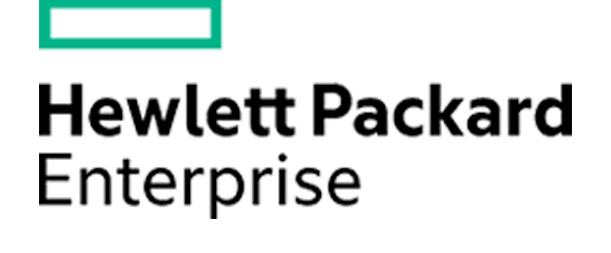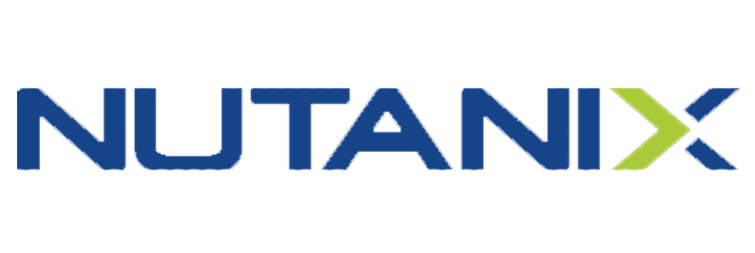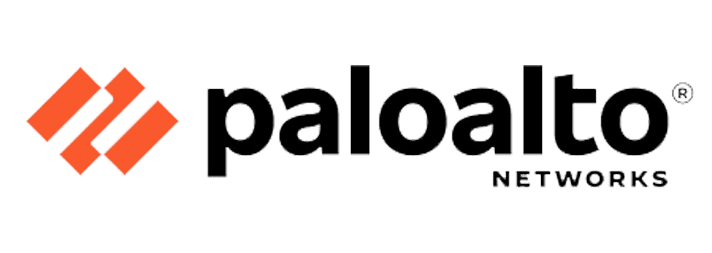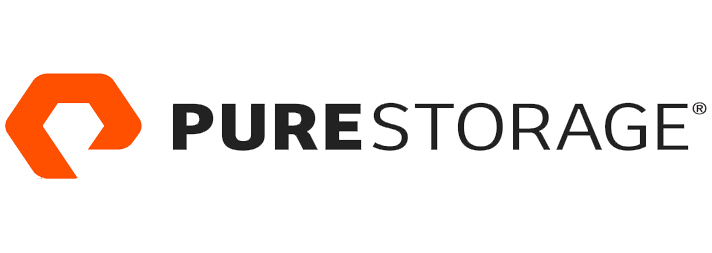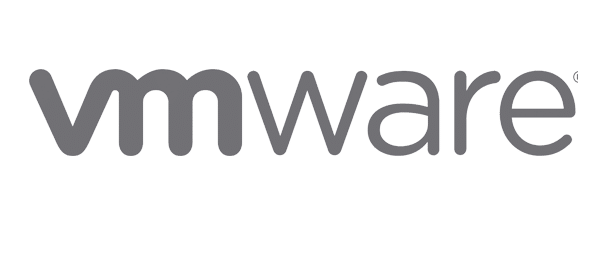Enhance Your Business With Hybrid Cloud Solutions
The cloud reigns supreme in today’s IT landscape, with 81 percent of respondents from the 2020 IDG Cloud Computing Study revealing their intention to maintain at least a portion of their enterprise in the cloud. But while most businesses rely on the cloud at least to a small extent, adoption remains uneven between organizations — and increasingly, between various departments at the same organization. Stark differences in adoption have been prompted, in part, by the sheer variety of options available for enterprise cloud storage.

Gain Agility without Sacrificing Security by Using Hybrid Cloud Solutions
Hybrid cloud solutions are increasingly popular among enterprises hoping to enjoy the best of both public and private solutions. These plans can be carefully tailored to meet the unique needs of each business. After all, the extent to which data needs to remain on-premises can vary dramatically from one organization to the next.
These needs may also evolve over time, with a single organization potentially requiring a significantly different approach as it grows and changes. Hence the value of the hybrid cloud, which offers the framework to support the fluid and agile approaches on which today’s evolving businesses rely.
Let’s explore the greatest benefits that hybrid cloud solutions hold for organizations looking to gain an IT edge.
Improved Security
Cloud security and compliance are understandably areas of great concern for enterprises in the midst of migration. In the report Cloud Vision 2020: The Future of the Cloud, 60 percent of respondents referenced governance and compliance as primary worries related to cloud adoption.
However, more and more companies are finding out that Private Cloud Options (IaaS coupled with BaaS Solutions and/or DRaaS) actually provide better data protection than they can deliver in-house. In particular, hybrid solutions are valued because they keep the naysayers at bay while allowing both the flexibility and security your team needs.
Organizations can now plan and execute a strategy based on data sets or individualized departmental needs. For example, your primary data may need a more expensive on-premise or private cloud option to ensure compliance and data retrieval. Secondary data however can be housed on less secure, and often less expensive clouds. The best part about hybrid cloud options is that you can define your own parameters and find private cloud or public cloud to satisfy your security needs. With increased threats and progressively more devious cybercriminals, your business can benefit from a hybrid cloud strategy that puts security at the forefront.
Better Data Storage
From cloud and flash storage to object storage, the options for hybrid cloud are limitless. Unfortunately, many businesses reference storage as the Achilles heel of migrating to the hybrid cloud, in part because disparate platforms can quickly prompt confusion.
Top challenges surrounding hybrid cloud storage solutions include:
-
- Determining which data sets should be stored where
- Migrating data from one location to the next
- Achieving an acceptable level of security without compromising accessibility

Despite the issues highlighted above, businesses increasingly recognize the value of hybrid data storage. As of 2016, the International Data Corporation (IDC) reported that already 68 percent of enterprises either planned to implement hybrid storage solutions or had already completed this critical task.
Hybrid storage is especially valuable for organizations looking to ramp up their current storage approach or those dealing with significant data increases YoY. This highly scalable and flexible solution allows sensitive or bandwidth-intensive data to be stored on-site as needed, while the cloud can be called upon for other storage needs. If your business isn’t using cloud storage, it simply will be left behind.
Minimize Downtime
Outages are devastating for modern businesses. Experts at Gartner estimate that downtime costs enterprises on average $5,600 per minute. Differences in how businesses operate can cause vast disparities in the overarching cost, but many suffer hundreds of thousands in losses in just one hour. Interruptions can harm employee productivity, client relationships, and ultimately, your organization’s reputation.
In addition to scalability, hybrid cloud solutions also serve a proactive function, allowing protective measures to reduce the conditions that can result in significant downtime. For example, additional cloud resources can be called on in times of heavy usage for mission-critical apps. If workloads are appropriately shifted, the potential for outages can be dramatically reduced. Should an outage occur, hybrid systems allow for optimized troubleshooting, and ultimately, a prompt solution.
The flexibility of a hybrid solution means that either public or private cloud infrastructure can be called upon as needed to minimize downtime should the worst-case scenario arise. There are as-a-service technology solutions from IaaS to DRaaS to BaaS that allow organizations to protect themselves without the monstrosity costs of yesteryear.
How is a Hybrid Cloud Different From On-Premise and Cloud Storage?
Keep in mind that with an on-premise storage solution, all the information that your employees are creating daily is stored locally on a server somewhere in your physical place of business. With cloud storage, that information is stored remotely in a data center so that people can access it anywhere, anytime and on any device.
A hybrid cloud platform is essentially the best of both worlds, combining an on-premises infrastructure (or a private cloud) with the flexibility that only public cloud storage can offer.
Essentially, hybrid cloud storage allows information and even entire applications to move between the two environments based on where they’re needed at the moment.
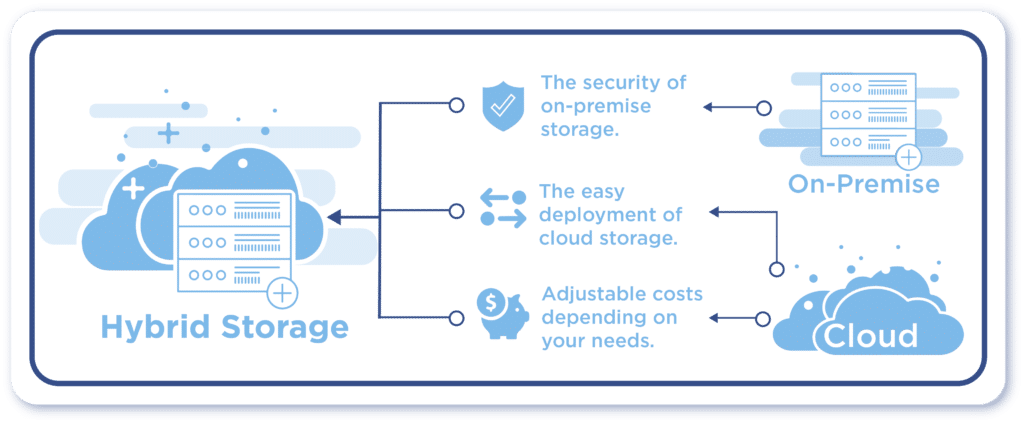
Security
Deployment
Cost
With the hybrid cloud, it’s far easier to anticipate changes in your needs because you’re only paying for the resources that you’re actively utilizing. Not only that, but you also avoid maintenance or configuration costs as well. The total price you pay is simply adjusted based on how much you’re actually consuming at the time.
The major area in which a fully on-premise environment does excel over alternatives, however, has to do with control. When setting up the entirety of a storage infrastructure in-house, companies have total control over all of their data. IT teams have complete say in where it is, how it’s accessed and what happens to it—for better or worse. In a cloud computing model or even with a hybrid cloud, some of that data is being stored remotely in a data center. This means giving up some of that control and placing a great deal of trust in the vendor you’ve selected.
Overall, there really is no “one size fits all” choice to make, here. Some organizations need the control (especially over security) that a fully on-premise environment brings with it. Others will depend on the flexibility that only comes from a hybrid cloud or full cloud computing model. Determining which option to choose is dictated by the unique needs of your business.
The strategic business advantages of hybrid cloud solutions cannot be denied. Still, this approach is only as valuable as the infrastructure and technological solutions that underlie it. A personalized approach is critical, with solutions ideally crafted to meet unique and ever-changing demands of business.
Comport’s 30+ years in technology solutions plus our certified partnerships with companies like HPE puts companies in expert hands for making IT decisions. Reach out to Comport today to request a Cloud Readiness Assessment for your business.

